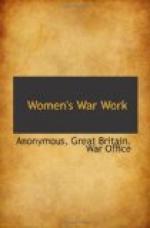WAR SAVINGS—THE MONEY BEHIND THE GUNS
“You cannot have absolute equality of sacrifice in a war. That is impossible. But you can have equal readiness to sacrifice from all. There are hundreds of thousands who have given their lives, there are millions who have given up comfortable homes and exchanged them for a daily communion with death. Multitudes have given up those whom they loved best. Let the nation as a whole place its comforts, its luxuries, its indulgences, its elegances, on a national altar, consecrated by such sacrifices as these men have made.”
—THE PRIME MINISTER.
“Deep down in the heart of every one of us there is the spirit of love for our native land, dulled it may be in some cases, perhaps temporarily obscured, by hardship, injustice and suffering, but it is there and it remains for us to touch the chord which will bring it to life; once aroused it will prove irresistible.”
—Sir R.M. KINDERSLEY, K.B.E.
CHAPTER IX
WAR SAVINGS—THE MONEY BEHIND THE GUNS
To win the war, we must save. There is no task more imperative, no need more urgent, and there is no greater work than the work of educating the peoples of our countries, and inducing them to save and lend to their Governments.
The first Government Committee set up in Britain to do propaganda work for war loans was established shortly after the war under the title of the “Parliamentary War Savings Committee.” It did some propaganda for the early war loans. At the same time a very interesting group of people associated with the “Round Table,” and including in it many of our most able financiers and economists—such men as the future chairman of the National War Savings Committee, Sir Robert M. Kindersley, K.B.E.; C.J. Stewart, the Public Trustee; Hartley Withers, Lord Sumner, T.L. Gilmour, Theodore Chambers (now Controller of the National War Savings Committee), Evan Hughes (now Organizer-in-Chief), Lieut. J.H. Curle, Countess Ferrers, Basil Blackett, C.B.; William Schooling and Mrs. Minty, Hon. Sec. Excellent articles were written, leaflets published and meetings held at which many of us spoke throughout the country, and valuable work was done towards educating groups of useful people in the country.
In 1915 a committee was appointed by the House of Commons to go into the whole question of Loans and Methods. The committee was presided over by Mr. E.S. Montagu, and its findings were of great interest. It advised the immediate setting up of a committee whose task it would be to create machinery by which the small investor might be assisted to invest in State Securities, and secondly, to educate the country as a whole on the imperative need of economy. The Lords Commissioners of His Majesty’s Treasury set up the National War Savings Committee in March, 1916, and in April, 1917, it became a Government Department. The first chairman was George Barnes, Esq., M.P., but very soon the chairmanship was taken by Sir Robert Kindersley, a director of the Bank of England, who has spent himself unceasingly in his great task.




